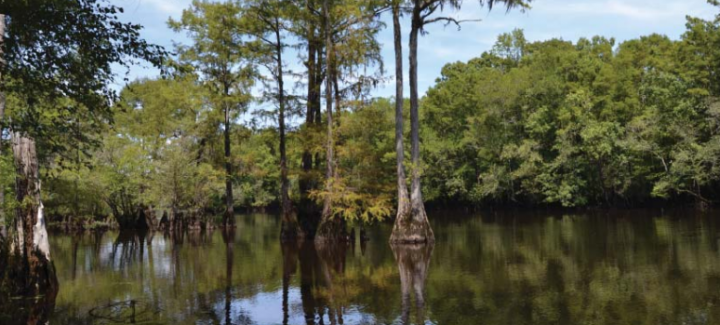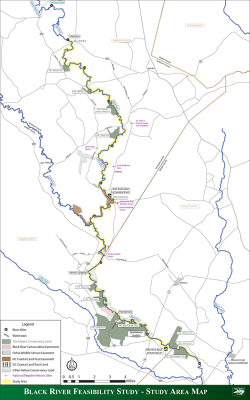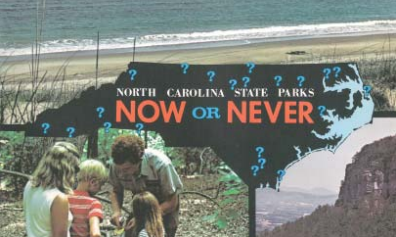
RALEIGH – The natural resources and conservation land along the Black River in southeastern North Carolina make it suitable to turn into a state park, one that would cost between an estimated $800,000 and $2.7 million, according to a state parks study.
The state could acquire land currently owned by The Nature Conservancy and create so-called “nodes” where water accesses, parking and picnic areas could be placed along the river, according to the recent North Carolina Division of Parks and Recreation feasibility study.
Supporter Spotlight

Those are the types of park amenities that appeal to a majority – 75 percent – of residents living in the counties that would be impacted by a Black River state park, according to an online survey conducted by the division.
Statewide, 91 percent of those who participated in the online survey said they would like some type of park amenity along the river.
Resources, Implications
The river, with its tea-colored water, includes miles of scenic natural resources and is home to swamps containing some of the oldest known living cypress trees in eastern North America.
Private property owners whose land abuts the roughly 50-mile river that meanders through Sampson, Pender and Bladen counties are concerned about the possible implications a state park would have on those resources.
Throughout a series of four public meetings the division hosted last fall, several of those residents expressed their worries about what hundreds, perhaps thousands, of visitors a year would mean for their land, the river, and the ancient cypress trees.
Supporter Spotlight
Property owners say they routinely must deal with trespassers and they argue that a high number of visitors a park may draw would put a strain on local emergency responders.
“There is both considerable support and localized concern related to the siting of a state park unit along the Black River,” the study concludes. “The Division recommends that the residents of Sampson, Pender and Bladen Counties continue to consider the benefits of a state park unit on the Black River to arrive at a community consensus on the proposal.”
Harold Corbett owns about 3 miles of property along the river in Sampson County.
“To me, land is very valuable,” he said. “The government can take it if they want to, I’m sure, but it’s not going to improve the river any. They’ve got these people thinking they’re going to have trails down there. Go in the winter time when the river’s up high. It’s a dangerous place. If they were going to build something it would be on the high parts of the land then you’re going to have to take it from somebody.”
The feasibility study reiterates what division officials have been saying for months that the state will not condemn land to create a park on the Black River.
According to the study, the division will request a clause be included in a bill authorizing a state park that reads, “The State may receive donations of appropriate land and may purchase other needed lands only from voluntary sellers for the Black River State Park.”
The Nature Conservancy owns more than 3,400 acres along the river. There are also conservancy land easements which protect the resources on properties from any type of development.
Throughout the 45-mile stretch of river area examined by the division, several large tracts of land – about 2,500 acres in Rowan – and about 900 acres of smaller tracts along the river, are suitable for development, according to the feasibility study.
There are currently only three public river accesses. Two of those are North Carolina Wildlife Resources Commission boat ramps, one in Ivanhoe and the other in Hunts Bluff. There is also a privately owned ramp in Rowan, where users pay a nominal fee to access the river.
All these accesses are in the lower section of the Black River.
Public river access would be added to the northern section of the river if a park is created and the division would ensure the river is cleared for “small motorized boats and watercraft traffic,” according to the study.
The last time the river was cleared by the Army Corps of Engineers, which is responsible for water navigation, was in 1967.
Clearing about 45 miles of the Black River would cost an estimated $116,500, or about $2,590 per mile.
“Funding for the clearing and snagging of the Black River is not currently allocated,” the study states.
This is not the first time the state has considered creating a Black River state park.
Not a New Idea

State parks and recreation officials initially looked into the idea of turning the Black River area into a park as part of a statewide plan in the early to mid-1970s.
The Black River was identified in 2001 as a state park priority in the division’s “New Parks for a New Century” initiative.
The division was directed last year by the North Carolina General Assembly to study the feasibility of acquiring land and creating a state park on the Black River.
The report has been submitted to the Joint Legislative Oversight Committee on Agriculture and Natural Economic Resources.







